In European and Asian wild boar populations, the number of chromosomes is generally 36, with some having more thanks to interbreeding with domestic pigs, which usually have 38 chromosomes.
Genetic studies show that the “boars” of Taiwan all have 38 chromosomes, indicating that they are not true wild boars but domesticated pigs gone wild. Hence, as agricultural researchers have noted, they do not fall under the Wildlife Conservation Act.
They don’t contain ractopamine either.
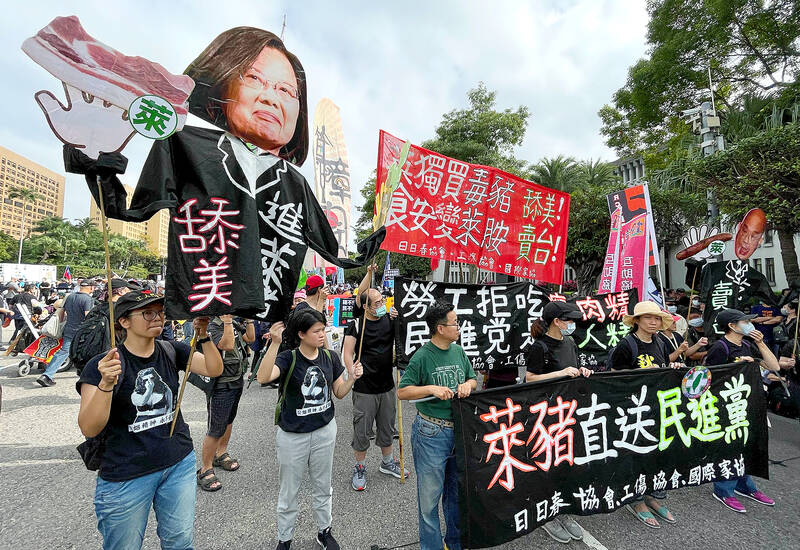
Photo: Liu Hsin-te, Taipei Times
What ever happened to the dreaded ractopork issue? Less than a year ago it was the subject of one of four referendums aimed at the Democratic Progressive Party (DPP) by the Chinese Nationalist Party (KMT), which positioned them as a vote of confidence in the administration. They failed, a clear win for the DPP.
The US had expressed worry that a rejection of ractopamine might complicate negotiations with Taiwan. Voters showed clear pragmatism. Indeed, that vote, in conjunction with public’s sensible 2018 vote on the hideous moniker “Chinese Taipei” for international sporting events, offer a stern rebuttal to the periodic cry from commentators that radical Taiwanese could declare independence at any moment and plunge the region into war.
Given the choice of sending pointless messages, or pragmatically preserving relationships with the outside world, Taiwanese voters chose the latter. Time for some trust, world.
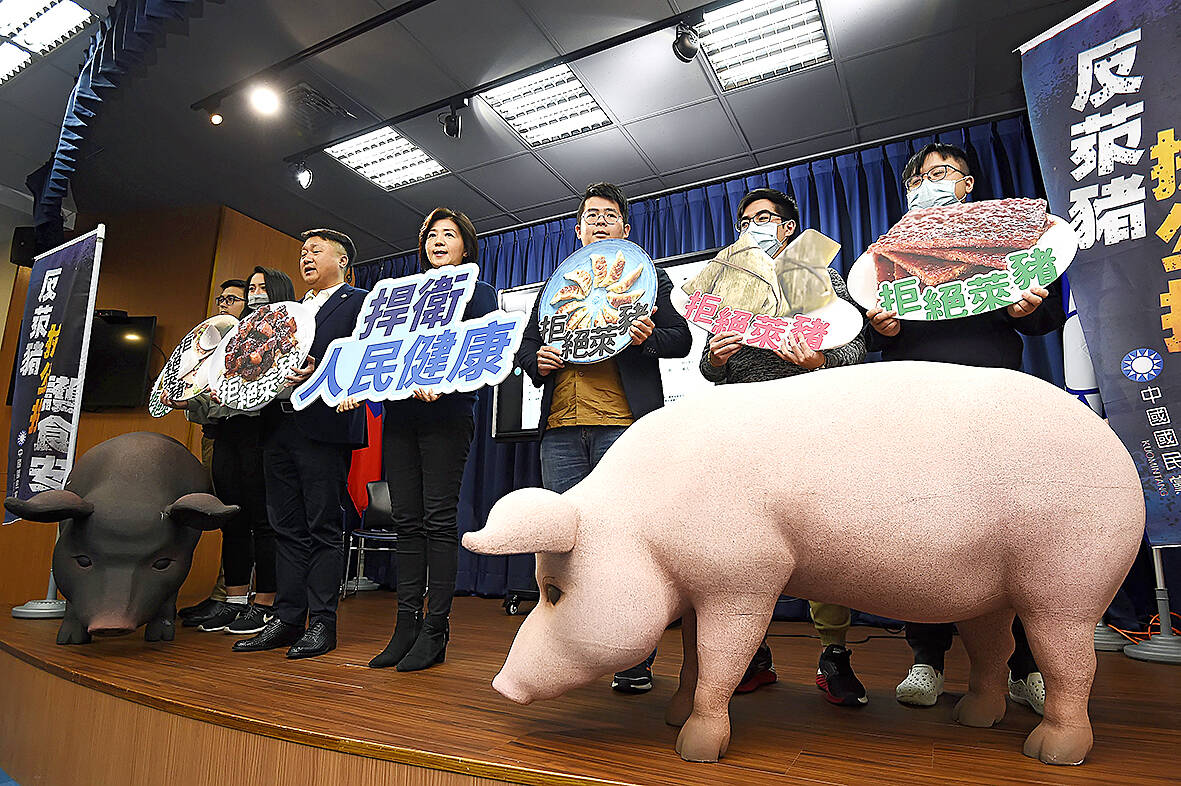
Photo: Chen Chih-chu, Taipei Times
NO ISSUE
The prohibition of ractopamine was lifted on Jan. 1 of last year, ending a long ban on the drug. President Tsai Ing-wen (蔡英文) had announced the decision on August 28, 2020. The government followed with a package of subsidies for farmers.
The move was widely expected to have a profoundly negative effect on the pork industry. A 2016 government study calculated that Taiwan’s pork farmers would take an NT$14.3 billion hit. Fear was widespread.
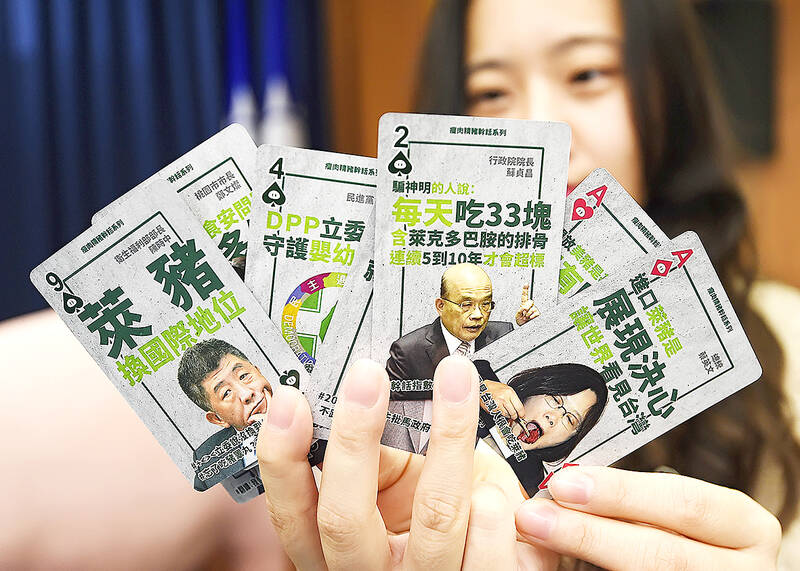
Photo: Chen Chih-chu, Taipei Times
The industry was in the doldrums, still reeling two decades after an outbreak of foot-and-mouth disease had destroyed Taiwan’s pork export market. Farmers claimed that consumers would give up pork completely.
A year later, the two-decade struggle over ractopamine, with its entertaining flip-flops by both major parties over the years, looks silly. Government figures released last February showed that pork consumption actually grew year on year the first month the ban was lifted.
The media hype instantly evaporated, a miniature case study: the international media was happy to hype ractopork tensions, but once it turned out there was no issue, and no more clicks to be had, it moved onto the next big hype. Articles that announce “nothing happened” don’t get eyes. Follow up? We need another piece on the fake claw machine “craze.”
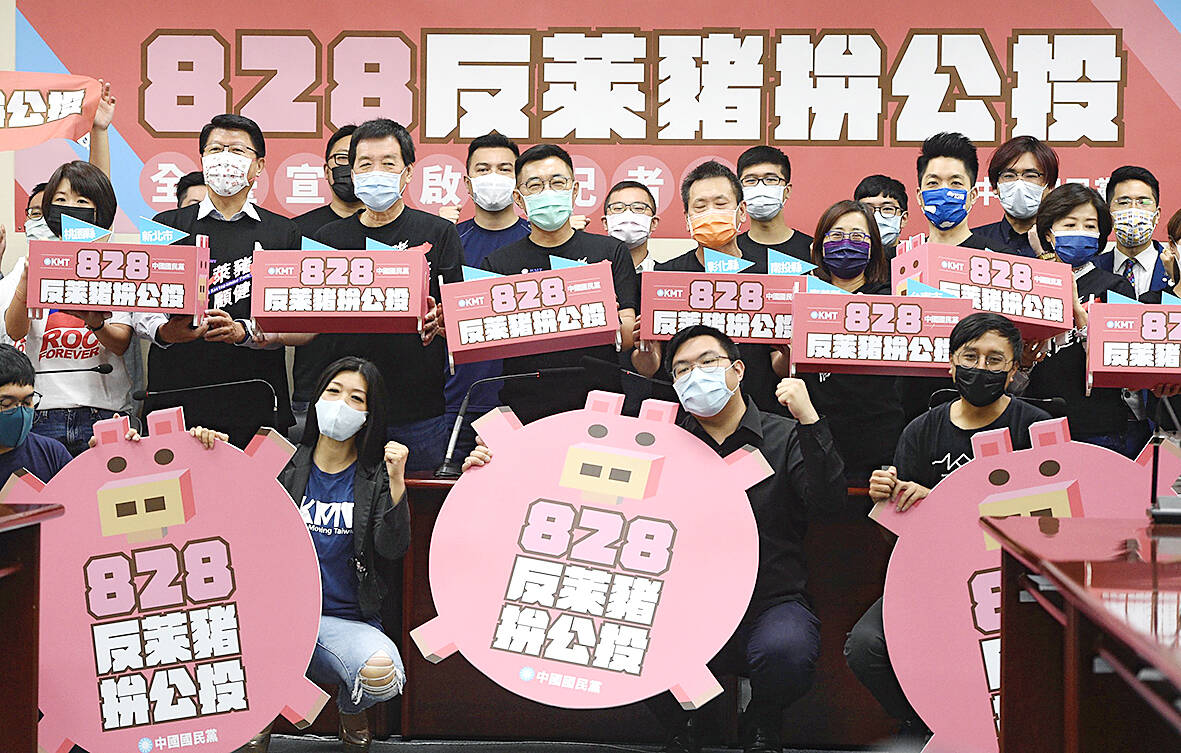
Photo: Tsung Tsang-chin, Taipei Times
BEATING EXPECTATIONS
Many commentators expected the DPP and Tsai to take a popularity hit. Polls late in 2020 indicated disapproval of the ractopamine policy.
The Taiwan Public Opinion Foundation (TPOF) found that food security was an area of dissatisfaction (49 percent) in a December poll, while a November TPOF poll showed 66 percent disapproved of the decision to lift the ban. There were public protests, and the pro-China opposition parties staged events to highlight the farmers’ problems.
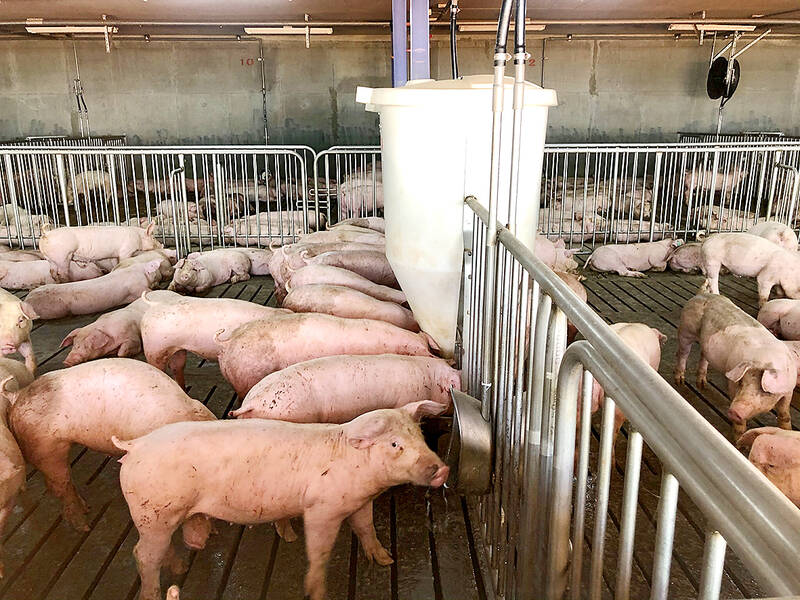
Photo: Lo Chi, Taipei Times
All that evaporated as pollsters lost interest (recall any recent polls on the question?). The president’s polling has been solid, and the DPP has by far the highest identification of any of the major parties. Nobody talks about ractopamine now. Taiwan produces more pork than it does the next three leading types of meat combined. Over 8 million pigs are slaughtered each year, the product of around 7,000 farms, 75 percent of which are considered small.
The industry is facing major problems this year. Pork prices have plummeted, yet feed prices have risen, squeezing small producers out of the business. Others have scaled back production hoping to push up prices. The government is putting in programs to help reduce the industry’s environmental effects and enhance its technologies.
On the pork industry’s long list of problems, imports from the US are a pimple. (The feed issue highlights Taiwan’s food security issues: 90 percent of it is imported, meaning that government attempts to get feed producers to increase output will have little effect on the overall situation. People often imagine Taiwan as nearly self-sufficient in pork, but in reality, pork is simply assembled rather than produced here. If Taiwan is blockaded, meat production will die off.)
Far from taking a hit, Tsai’s political gamble that the US would respond positively paid off in August of this year when the US announced for the 1,345,613th time that it would initiate negotiations on a bilateral trade agreement with Taiwan, launching the “US-Taiwan Initiative on 21st Century Trade” (the phrase “21st Century” indicates when the negotiations results will appear).
An article by a pair of prominent Asia watchers previously warned that it could be a while before the Biden administration even gets around to thinking about a trade agreement. In December of 2020 Biden, then president-elect, said he would not be rushing into trade deals.
Once again, the Tsai administration beat expectations and negative results did not occur.
CONTRASTING RESULTS
It is interesting to contrast the tranquil results of Tsai’s decision-making with that of the Ma Ying-jeou (馬英九) administration. Recall that the ractopamine issue was brought up again by the Ma administration (which had begun ractopamine testing in 2011, though the DPP banned it in 2006, they had never tested for it), while negotiating the services pact with China.
It was not a coincidence that the KMT had revved up the ractopamine issue, but part of a strategy to use the issue to irritate relations with the US and push Taiwan toward China, a strategy it deployed again last year with the ractopamine referendum. It also exploited that issue in the Ma years to put the DPP at odds with US interests.
Yet, during the Ma years, the largest exporter of pork products to Taiwan was not the US, but Canada (which passed the US in 2009). If the effect of pork imports on Taiwan’s markets had really been the issue, Ma and the farmers would have complained more about Canada.
Tsai has reversed all that. With the announcement of large increases in defense spending in the next fiscal cycle, she has basically given Washington all it has asked for, quietly, reliably and pragmatically.
The president’s pragmatism and incrementalism are, by and large, the traits of her people. It’s time for the trope of a Taiwan populated by madmen ready to plunge the region into war to be banished from commentary. Madness is a trait of the sociopaths of Zhongnanhai, not the Taiwanese resisting them.
Time also to reward President Tsai with some reciprocity. Munitions, please, in quantity. And a trade pact.
Notes from Central Taiwan is a column written by long-term resident Michael Turton, who provides incisive commentary informed by three decades of living in and writing about his adoptive country. The views expressed here are his own.

Jacques Poissant’s suffering stopped the day he asked his daughter if it would be “cowardly to ask to be helped to die.” The retired Canadian insurance adviser was 93, and “was wasting away” after a long battle with prostate cancer. “He no longer had any zest for life,” Josee Poissant said. Last year her mother made the same choice at 96 when she realized she would not be getting out of hospital. She died surrounded by her children and their partners listening to the music she loved. “She was at peace. She sang until she went to sleep.” Josee Poissant remembers it as a beautiful

For many centuries from the medieval to the early modern era, the island port of Hirado on the northwestern tip of Kyushu in Japan was the epicenter of piracy in East Asia. From bases in Hirado the notorious wokou (倭寇) terrorized Korea and China. They raided coastal towns, carrying off people into slavery and looting everything from grain to porcelain to bells in Buddhist temples. Kyushu itself operated a thriving trade with China in sulfur, a necessary ingredient of the gunpowder that powered militaries from Europe to Japan. Over time Hirado developed into a full service stop for pirates. Booty could

Before the last section of the round-the-island railway was electrified, one old blue train still chugged back and forth between Pingtung County’s Fangliao (枋寮) and Taitung (台東) stations once a day. It was so slow, was so hot (it had no air conditioning) and covered such a short distance, that the low fare still failed to attract many riders. This relic of the past was finally retired when the South Link Line was fully electrified on Dec. 23, 2020. A wave of nostalgia surrounded the termination of the Ordinary Train service, as these train carriages had been in use for decades

Lori Sepich smoked for years and sometimes skipped taking her blood pressure medicine. But she never thought she’d have a heart attack. The possibility “just wasn’t registering with me,” said the 64-year-old from Memphis, Tennessee, who suffered two of them 13 years apart. She’s far from alone. More than 60 million women in the US live with cardiovascular disease, which includes heart disease as well as stroke, heart failure and atrial fibrillation. And despite the myth that heart attacks mostly strike men, women are vulnerable too. Overall in the US, 1 in 5 women dies of cardiovascular disease each year, 37,000 of them